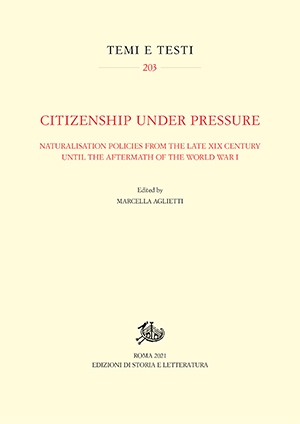Citizenship under pressure
Naturalisation policies from the late XIX century until the aftermath of the World War I

https://www.storiaeletteratura.it/catalogo/citizenship-under-pressure/11205
Il periodo compreso tra la fine dell’Ottocento e il primo dopoguerra appare una fucina di emblematica rilevanza nella produzione di alcune tra le più incisive azioni intraprese dagli Stati in materia di cittadinanza. Con il crollo degli Imperi europei ed ottomano e le conseguenze deflagranti della Prima guerra mondiale, le politiche di cittadinanza furono sottomesse a uno stress-test: non vi fu ordinamento statuale del continente europeo che non riformulò i presupposti identitari dell’appartenenza e le procedure per giustificarla. Stabilire la pertinenza di ciascun individuo rispetto al proprio Stato divenne una priorità. Gli stranieri e i migranti, così come le comunità israelitiche e altre minoranze linguistiche, etniche e religiose, furono le prime ad essere interessate da queste misure, e la divisione dicotomica tra cittadini e non investì sia i paesi belligeranti, sia i neutrali. Sorte sulla duplice esigenza di risolvere problemi specifici e di regolamentare il regime dell’appartenenza in termini generali, le procedure amministrative introdotte ricorsero a criteri d’identificazione risultati spesso inadeguati, quando non apertamente contraddittori o inattuabili, eppure destinati a particolare persistenza nei decenni successivi e, spesso, ancora presenti nella disciplina dei processi d’integrazione e dei fenomeni migratori. Attraverso l’analisi di casi di studio e grazie agli strumenti metodologici di una “storia delle cittadinanze in pratica”, si tenterà di far emergere i caratteri distintivi di questo processo di revisione normativo-amministrativa, politica e identitaria e di ipotizzare almeno possibili modelli interpretativi.
The period between the late nineteenth century and the first post-war years appears to be a crucible of symbolic importance in the production of some of the most incisive moves taken by States in matters of citizenship. Following the collapse of the European and Ottoman Empires and the explosive consequences of the First world war, citizenship was put “under pressure”: there was no State authority in Europe that did not reformulate the identity assumptions of belonging and the procedures for authenticating them. Establishing each individual’s relationship to their home State became a priority. Foreigners and migrants, such as Jewish communities and other linguistic, ethnic and religious minorities were the first to be affected by these measures, while the dichotomous division between citizens and non-citizens applied to both the belligerent and the neutral countries. Arising from the need to solve specific problems and to regulate the system of belonging in general terms, the administrative procedures that were introduced used identification criteria that were often inadequate, if not openly contradictory or impracticable, but which nevertheless carried on into the following decades, and often are present still today in the discipline of integration processes and migratory phenomena. Through the analysis of case studies and thanks to methodological instruments of a “history of citizenships in practice,” we will attempt to elucidate the distinctive characteristics of this normative-administrative, political and identity review process, and to hypothesise some at least possible interpretative models.
